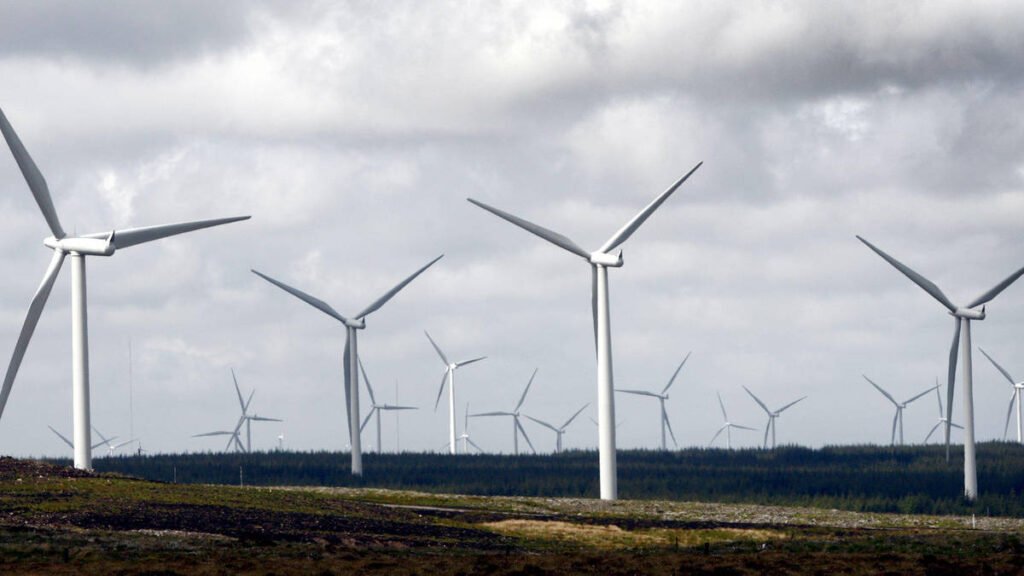27 May 2025, 00:56

Picture:
Alamy
The UK is losing the skills and supply chain needed to deliver net zero, with a growing share of energy sector jobs, investment and innovation shifting abroad, according to a new report.
The 41st Energy Transition Survey, published by Aberdeen and Grampian Chamber of Commerce, shows an exodus of activity and talent from the UK Continental Shelf (UKCS).
The survey of more than 100 firms shows that two-thirds expect to increase their headcount overseas in the next five years.
Almost half said staff were already leaving the UK to work in other energy regions, triggered by weak domestic confidence, uncompetitive policy and a lack of viable projects.
Firms expect the majority of their work will be overseas by 2030, with the tipping point coming in around 2027-28.
They warn the current trajectory could permanently undermine the UK’s ability to deliver net zero using domestic supply chains.
Russell Borthwick, chief executive of Aberdeen and Grampian Chamber of Commerce, said: “This is a wake-up call for policymakers.
“We are training a world-class workforce and building the technology to lead the energy transition, but that talent and investment is increasingly being deployed overseas.
“You cannot deliver net zero by exporting your industrial base.
“If we continue to erode competitiveness through incoherent energy policy and excessive taxation, we risk offshoring the entire supply chain that is essential to the UK’s future energy system.
“We’ve had enough consultations. The answers are already on the table.
“A coalition of trade unions, academics, business leaders and sustainability groups recently published a clear way forward through the North Sea Transition Taskforce.
“This is the solution government requires. The North Sea doesn’t need a bailout, just stability, vision and fairness.”
Read more: UK to open talks with Kosovo on hosting ‘return hub’ for failed asylum seekers
Read more: Labour could grant benefit claimants more time to seek support before £5 billion welfare cuts

Picture:
Alamy
The 41st Energy Transition Survey was produced in association with Johnston Carmichael and clean energy company D2Zero.
Mark Stewart, head of energy, infrastructure and sustainability at Johnston Carmichael, said: “This survey reinforces what we are hearing daily from the companies we advise, that uncertainty and inconsistency in UK energy policy are now bigger threats to investment than commodity prices or global market trends.
“The energy transition isn’t failing because of a lack of ambition, it’s failing because of a lack of execution.
“Businesses are ready to invest, innovate and diversify, but they need stable, predictable conditions to do so. Right now, the economics simply don’t stack up for many green projects.
“We are seeing a growing trend of skills, capital and capability moving overseas, particularly in areas like offshore wind, carbon capture and decarbonisation technologies.
“That’s deeply worrying, because it’s the same supply chain we’ll need to deliver a net zero system here in the UK.
“There’s still time to reverse that trend, but it will require faster project approvals, a stable tax regime, and co-ordinated policy leadership.
“If we can bridge the gap between today’s oil and gas activity and tomorrow’s clean energy projects, we can create a sustainable path forward for both our economy and the environment.”
Bob Drummond, chief executive of D2Zero, said: “The UK has the talent, the technology and the track record to lead the global energy transition, but we are now at serious risk of falling behind due to fragmented thinking and short-term policymaking.
“This report lays bare a critical truth: if we don’t act decisively, the infrastructure and ingenuity we need to build a low-carbon future will be deployed elsewhere.
“And once that capability is gone, it will be extremely difficult to rebuild.
“Energy transition isn’t a switch we flip overnight, it’s a series of complex, interconnected projects that require sustained momentum.
“A co-ordinated national delivery plan to bridge the gap between where we are and where we need to be will ensure progress is practical, investment is aligned, and no region or sector is left behind.
“From offshore electrification and carbon capture to advanced decommissioning and hydrogen, the UK has real advantages.
“We need to create the right environment to keep projects moving and capital flowing, to ensure high-value jobs and strategic independence.”
A UK Government spokesperson said: “The Government recognises that oil and gas production in the North Sea will be with us for decades to come and is committed to managing the energy transition in a way that supports jobs in both existing and future industries.
“We have taken rapid steps to deliver the next generation of good jobs for North Sea workers in a fair and orderly transition as part of our plan for change, including the biggest investment in offshore wind and two first-of-a-kind carbon capture and storage clusters.
“This comes alongside Great British Energy, which has already announced a £300 million investment in British supply chains, unlocking significant investment and helping to create thousands of skilled jobs, as we progress our mission to make the UK a clean energy superpower.”

